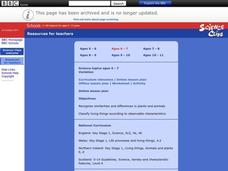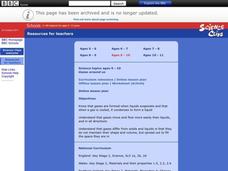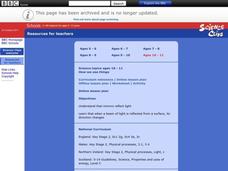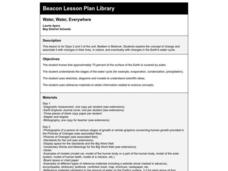Curated OER
Paleogeographic Mapping (o.k. Fossils Are Neat But What Good Are They?)
Students examine how evidence from fossils can be used in paleogeographic interpretation. They gain experience in developing multiple hypotheses.
Curated OER
WHY WE AREN'T FILTER FEEDERS
Young scholars describe three methods of obtaining food: scavenging, filter feeding, and hunting. They describe three methods of obtaining food: scavenging, filter feeding, hunting, and list at least two reasons why humans are not...
Curated OER
Ourselves
Learners use a website to name and compare external body parts of humans and other animals.
Curated OER
Sound and Hearing - Internet Research
Students use a website to help them recognize that sound is generated in a variety of ways and from different sources. They determine that sounds vary in tone and loudness, and learn there are different ways to describe sound.
Curated OER
Moving and Growing
Pupils know that humans and some other animals have bony skeletons inside their body. They know that other animals have skeletons on the outside of their bodies. They explain the role of both kinds of skeletons.
Curated OER
Circuits and Conductors
Students participate in an online lesson to explain the conductivity of different materials and the effect of changing the power source.
Curated OER
Variation
Students participate in an online lesson to reinforce the similarities and differences in plants and animals. They classify living things according to observable characteristics.
Curated OER
Gases Around Us
Learners participate in an online lesson plan showing that gases are formed when liquids evaporate and that when a gas is cooled, it condenses to form a liquid, and gases move and flow more easily than liquids, and how gases differ from...
Curated OER
Changing State
Students participate in an online lesson to investigate the effects of cooling and heating on water.
Curated OER
Helping Plants Grow Well
Students explain the effect of water, temperature and light on plant growth.
Curated OER
Micro-organisms
Students examine how micro-organisms are living organisms that are often too small to be seen. They explain that micro-organisms may be beneficial or harmful.
Curated OER
Forces in Action
Students ask questions that can be investigated scientifically. They determine how to plan a fair test by changing one factor while keeping other factors the same, to use measurements to draw conclusions and use scientific knowledge to...
Curated OER
How We See Things
Students explain that mirrors reflect light. They examine how when a beam of light is reflected from a surface, its direction changes.
Curated OER
Changing Circuits
Students participate in an online lesson to explain how to make bulbs brighter or dimmer in a series circuit by changing the number or type of components.
Curated OER
Toothpick Breakdown
Fourth graders model the activity of an enzyme acting on a substrate and observe relationships. Have students place toothpicks in a pile. One member of the team should break as many toothpicks as possible, in 10 seconds.
Curated OER
Lords of the Night
Second graders explore bird classification, specifically owls. They dissect their own owl pellet and explain the predetor and prey relationship.
Curated OER
Fish Workings
Students observe, hypothesize, and draw conclusions regarding fish. They examine their anatomy, and how they function in their environment.
Curated OER
Linnaeus' Latin Lingo
Students use Latin and Greek words to figure out species names for whales.
Curated OER
Dinosaur I Finding And Dating
Students investigate how long dinosaurs lived on Earth and how that compare to how long man has been on Earth. They discover how scientists excavate fossils.
Curated OER
Sounds Like Science - Kazoo
Students discover that energy is needed to produce sound. They see that identifying where the energy comes from enables us to control the type of sound produced. They play the kazoo and manipulate the sound in a variety of ways.
Curated OER
Coloration
Students conduct an experiment picking out colored vs. camoflauged toothpicks out of the grass. They list and describe different types of coloration and explain how coloration assists the great horned owl and the striped skunk survive.
Curated OER
Partners in Nature
Students role-play how animals and plants depend on and help each other in symbiotic relationships. Working in pairs, they role-play the animals' relationship. They may also choose to draw pictures of these partnerships.
Curated OER
Water Quality Issues
In this unit of lessons, pupils examine water quality issues. They discover ways they can conserve water and practice making drinkable water from water desalination.
Other popular searches
- Brushing Teeth
- Animal Teeth
- Dinosaur Teeth
- Teeth and Dental Health
- Teeth Dental Hygiene
- Healthy Food and Teeth
- Teeth and Eating
- Brush Teeth
- Baby Teeth
- Flat and Sharp Teeth
- Sequencing Brushing Teeth
- Science Activity Teeth

























